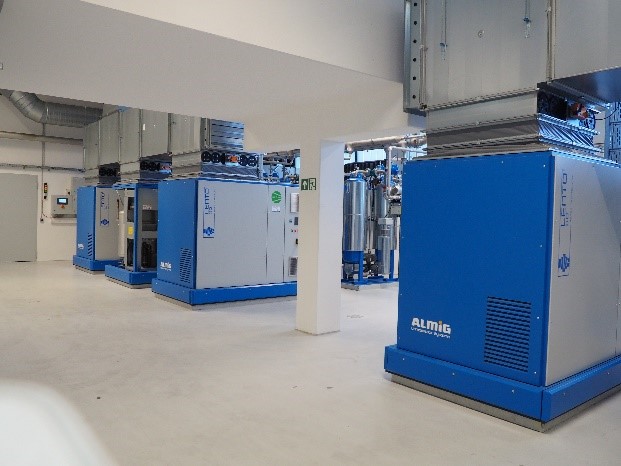News
Röchling Medical Solutions SE relies on oil-free screw compressors with energy-saving heat recovery from ALMiG

"We manufacture primary packaging for pharmaceutical products under state-of-the-art cleanroom conditions in GMP C and D class," explains Jürgen Neubauer. He is Manager Technical Building Equipment at Röchling Medical in Neuhaus am Rennweg, a small town in the Thuringian Forest. "We inaugurated the building for the cleanrooms in 2017. We had to expand our production capacities here at the site in order to be prepared for future growth," he says. In 2016, the Röchling Group added the Medical division to its two previous divisions, Industrial and Automotive. Various major projects quickly emerged. The company reacted.
Röchling Medical exports around half of its products abroad. These include closures, measuring cups, dropper inserts and pourers with different dosing options as well as various containers: "We can produce vials with a capacity of two millilitres and all dimensions up to canisters of ten litres or even larger," explains Neubauer, pointing to the machines that manufacture products in cleanroom class GMP "C". To produce the hollow bodies, we rely on multi-layer extrusion blow moulding, among other things." In this process, plastic is melted and pressed through a nozzle. The result is a tubular preform that is transferred to the blow mould. Increased pressure causes it to adapt to the inner contours of the mould. The forming process is also carried out using blown air in the mould. "We can also produce hollow bodies with a multi-layered wall structure in this way," says Neubauer. This is crucial for the quality of the products: The blowing air must not introduce any germs into the material. This is why particularly high demands are placed on the purity of the compressed air.
Oil-free and germ-free compressed air
Until the new build in 2017, Röchling Medical relied on oil-injected compressors. To remove the oil from the compressed air, each system was equipped with its own treatment chain consisting of a cyclone separator, pre-filter, dryer, after-filter and activated carbon filter. "Nevertheless, there is always a risk of contamination with oil-injected machines. If oil were to get into the pipework, this could lead to serious economic damage for us," says Neubauer. "Our aim was to achieve compressed air class 1, while at the same time enabling safer operation and working more energy-efficiently."
Those responsible looked at various concepts from different suppliers. In the end, ALMiG Kompressoren GmbH from Köngen, Swabia, near Stuttgart, was able to convince them with its water-injected machines from the LENTO series. "We were impressed by the coherent machine concept," recalls the Röchling expert.
A reliable partner
Uwe Herrmann is Managing Director of KFA Drucklufttechnik from Zwenkau, south of Leipzig. With his company, he offers maintenance and service as well as project management and sales of compressors. He is also a sales partner of ALMiG. "In an initial discussion, it quickly became clear that we could supply both the compressed air supply and all the necessary components from a single source, meaning that the customer would not have to work with different suppliers," explains Herrmann. "We have set up an energy balancing system. This allows us to measure compressed air consumption and power consumption." The software analyses the results and creates various simulations. Compressors are replaced in a targeted manner until the expert achieves the optimum energy result for the customer. The measurements were carried out at off-peak times and also at full capacity. After a detailed analysis, the expert recommended the LENTO 110 water-injected screw compressors from ALMiG, which can provide a volume flow of 16 cubic metres per minute at ten bar overpressure.
When the building for the new compressed air station was completed, the first four units were installed. A few months later, two more compressors from the same series followed. In 2021, the managers at Röchling decided to invest in another machine from the LENTO series due to the increasing order situation. Production runs 24 hours a day, seven days a week. With the installation of the new compressors, the old systems were gradually taken off the grid.
Low speed, long service life
The LENTO systems have significantly lower maintenance costs compared to alternative technologies, such as dry-running screw compressors. "This is mainly due to their simple design," explains ALMiG expert Herrmann. "The compressor stages of water-injected screw compressors operate at four to five times lower speeds than the dry-running variant. This has a positive effect on the service life of the bearings and therefore on operational reliability." Water also has a much better heat absorption capacity compared to oil. "With these compressors, we have very low final compression temperatures of well below 60 degrees Celsius. The process is close to isothermal compression, which ensures better efficiency and therefore greater cost-effectiveness," explains Herrmann.
The speed control was particularly convincing. This allows the plant to react to the changing demand for compressed air. The compressors always produce the amount of air required at any given time - and therefore only consume the corresponding amount of energy. When idling, standard compressors without speed control require around 25 to 40 per cent of the energy that is consumed under full load - without producing compressed air. The load-idle control of a standard compressor in conjunction with a fluctuating compressed air demand therefore causes expensive idle times. By using screw compressors of the same size, the systems can be evenly utilised through constant base load changes. The utilisation rate is between 60 and 70 percent. The machines are used in rotation - always five at the same time. As the machines are in the optimum speed range, both the energy requirement and the noise emissions are lower.
The ALMiG Air Control HE controller with integrated web server is used, via which all relevant data can be read out online - for example, the running behaviour of the past operating days or weeks, how heavily the compressors are being used and when the next maintenance is due. The control system also records the amount of air consumed and the energy consumption. "If we notice a significant change in operating behaviour, an alarm is triggered and we can react immediately," explains Neubauer.
But even if the LENTO compressors work optimally at low temperatures, they convert a large proportion of the energy used into heat. To prevent this from simply going to waste, the systems are equipped with an integrated heat recovery system ex works. "We use this heat to heat our cleanrooms in winter and dehumidify them in summer. That's almost 2,000 square metres," says Röchling expert Neubauer enthusiastically. "This eliminates the need for district heating, heating oil and gas - and that with an enormous energy requirement."
Always fresh water
Those responsible at Röchling Medical were particularly impressed by the principle of washed compressed air, as used in the water-injected LENTO screw compressors. "The compressed air is cleaner than the fresh air drawn in for compression because the foreign particles it contains are effectively washed out by the circulating water," explains Herrmann. This has been confirmed by several independent, renowned institutes - including Fresenius. A refrigeration dryer is integrated into the LENTO system, which is an essential part of the water treatment process. "The compressor is filled with normal tap water during commissioning," explains the compressed air expert. "The condensate produced is collected at the condensate drain of the refrigeration dryer and fed back into the internal cooling circuit as fresh water." On average, the entire water volume is exchanged in this way once per shift. The system therefore always works with fresh water. There is no need for a complex water treatment system. "The fresh water produced in this way is limescale-free - and free from viruses, bacteria or algae. It can be discharged into the sewerage system without treatment," says Herrmann. "We are here in the Thuringian Forest. The seeds from the pine trees produce very small particles that settle as a yellow mist. If a compressor sucks in these organic substances, self-ignition can occur. With the LENTO machines, these particles are completely washed out."
Not off the peg
Herrmann and his team at Röchling have installed anything but a standard system. In terms of safety, this is unique in the world, he says. "For example, the compressors switch off automatically if the measurement technology registers changes in environmental conditions, such as residual oil aerosols. These can be caused by lorries stopping near the compressed air station with the engine running, for example.
"If a compressor sucks in this air, it can jeopardise safe production," says Neubauer. In this case, the compressed air is not fed into the network but into an expansion chamber - until the values are stable again. What's more, KFA Drucklufttechnik only provides 1.2 litres of oil for bearing lubrication for each machine per maintenance cycle. With the old, oil-injected systems, this was 80 litres in each case. This also ensures significantly higher operational reliability, as required by ISO and the FDA. Jürgen Neubauer looks at the measurement technology. "With the machines and the associated preparation, we have a pressure dew point of -50 to -60 degrees. This also has a positive effect on air purity. If you imagine that there are around three million particles in one cubic metre of compressed air and that we can reduce this number to up to 200, depending on the size, that's very impressive."
Uwe Herrmann and his maintenance team are on site at Röchling in Neuhaus on this day. "Our visit to the LENTO machines is only necessary every 4,000 operating hours," he says. That corresponds to about two inspections a year. Jürgen Neubauer is satisfied with the system and that he gets everything from a single source with ALMiG and KFA Drucklufttechnik - including reliable service. "The project was certainly not standard," he says. When the new machines were installed, we couldn't simply switch off the old compressors. To avoid interrupting production, this had to be done step by step. This is only possible with an experienced partner," he says. Today, everything is running to his complete satisfaction.





